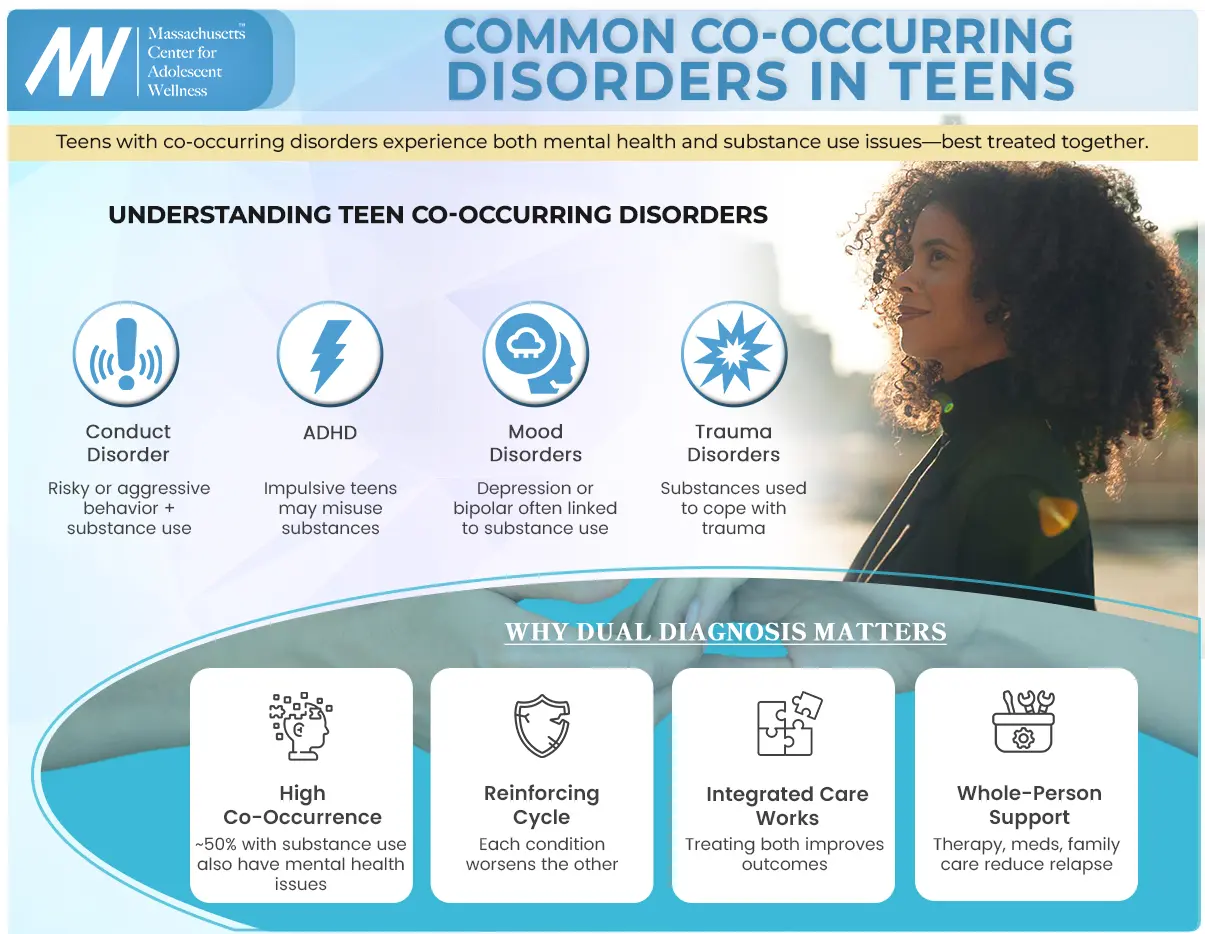Dual diagnosis is a term used when an individual has a mental health condition and a substance use issue concurrently. This condition presents a unique set of challenges as both issues often fuel each other, making it harder to tackle either in isolation. This is where a dual diagnosis treatment program comes into play.
A dual diagnosis treatment program follows a comprehensive approach that combines evidence-based therapies, medication management, and support services to address all underlying issues holistically. Massachusetts Center for Adolescent Wellness offers a dual diagnosis treatment program as one of our mental health treatments for adolescents. If you would like to learn more about treating co-occurring conditions, such as depression and addiction, please don’t wait to contact us to find suitable treatment for your child.
Dual Diagnosis Adolescent Treatment Centers: What Is a Dual Diagnosis?

Receiving a dual diagnosis means experiencing two separate issues simultaneously, and both conditions require treatment. These two conditions often go hand in hand, each exacerbating the other. For example, someone struggling with a depressive disorder may engage in drug use or alcohol consumption as a risky coping mechanism, especially among teenagers with dual diagnoses. This drug use can negatively impact both physical appearance and mental health, often leading to addiction. However, substance use can also lead to mental illness due to changes in brain chemistry and increased stress and anxiety disorders.
It is estimated that about 50% of individuals with a substance use disorder also have a co-occurring mental health condition, making it a common issue that needs to be addressed. Recovery can be challenging without proper treatment for both conditions simultaneously, and relapse rates are higher. However, with appropriate treatment, wellness is possible.
Common Co-Occurring Disorders in Teens

Co-occurring disorders, or dual diagnosis, is a term used in adolescent health care to describe a situation where a teenager is simultaneously dealing with a mental health disorder and substance use issues. Drug use is often seen as a form of risky behavior and a coping mechanism among teenagers with dual diagnoses, which can negatively impact both their physical appearance and mental health. Teens with substance use disorder frequently also experience co-occurring conditions such as:
Conduct Disorder (CD)
Adolescents diagnosed with CD, characterized by aggressive, destructive, or deceitful behavior, often exhibit a higher propensity for substance use.
Attention-Deficit/Hyperactivity Disorder (ADHD)
Adolescents with ADHD, a disorder marked by inattention, hyperactivity, and impulsivity, may have a higher likelihood of substance misuse, potentially as a coping mechanism for their ADHD symptoms.
Mood Disorders
Mood disorders, which include conditions like depression and bipolar disorder, often co-occur with substance use in adolescents. The misuse of substances can exacerbate mood instability, further complicating treatment efforts.
Trauma-Related Disorders
Adolescents with trauma-related disorders, such as post-traumatic stress disorder (PTSD), may resort to substance use to alleviate their distressing symptoms.
The challenges of treating these dual diagnoses are unique, as each condition can amplify the other, complicating treatment. Recognizing these common co-occurring disorders and developing comprehensive, multifaceted treatment strategies are essential in addressing adolescent health concerns.
Identifying the Signs of Substance Use
Identifying substance use in teens can be challenging, given the typical behavioral changes that occur during adolescence. However, there are several telltale signs to look out for.
Behavioral signs may include:
- Significant changes in behavior, such as sudden secrecy or withdrawal from friends and family
- Drop in academic performance
- Loss of interest in previously enjoyed activities
- Unusual mood swings
- Beyond behavioral signs, physical and psychological signs can indicate substance use in teenagers.
Some of these can include:
- Changes in appetite or sleep patterns
- Poor physical coordination
- Unexplained injuries
- Noticeable decline in personal grooming
- Unexplained paranoia
- Periods of unusual hyperactivity or agitation
- Lack of motivation
- Sudden bouts of anxiety or fearfulness
It’s essential to remember that these signs may also indicate other underlying issues, so professional consultation is crucial for an accurate diagnosis.
Overcoming Barriers to Treatment for Teens with Dual Diagnosis
Teens struggling with dual diagnosis—co-occurring mental health disorders and substance use disorders—often face significant barriers when seeking appropriate treatment. These challenges can make it difficult for young people and their families to access the care and support they need for lasting wellness.
Building Awareness
One of the most common obstacles is a lack of awareness about dual diagnosis and the available treatment options. Many families may not recognize the telltale signs of co-occurring disorders, such as sudden changes in behavior, risky behaviors, or shifts in mood and social interactions. Improving communication and providing education about dual diagnosis, its symptoms, and the importance of early intervention are essential steps in helping teens get the support they need.
Mental Health Stigma
Stigma surrounding mental illness and addiction can also prevent teens from reaching out for help. Feelings of shame or fear of judgment may cause them to hide their struggles, delaying access to treatment. Creating a supportive environment is crucial for breaking down these barriers. If your family is facing these challenges, know that help is available—treatment centers in Massachusetts are ready to provide the care and support your teen needs for a sustainable recovery.
A comprehensive approach to dual diagnosis treatment involves a multidisciplinary team of professionals, including psychiatrists, registered nurses, case managers, social workers, and licensed mental health counselors. This team works together to develop a personalized treatment plan that addresses each teen’s unique needs, combining evidence-based therapies, medication management, group therapy, and family therapy. By treating both the mental health and substance use disorder simultaneously, teens are better equipped to manage their symptoms and achieve long-term recovery.
Addressing underlying issues such as depression, anxiety, or bipolar disorder is also a key component of effective dual diagnosis treatment. By identifying and treating these root causes, treatment centers can help teens break the cycle of addiction and mental health struggles, paving the way for improved well-being and a brighter future.
In addition to direct treatment services, ongoing support and resources are vital for both teens and their families. Education about dual diagnosis, guidance on accessing addiction services, and referrals to community resources can all help families and teens navigate the recovery journey with confidence.
How Can a Dual Diagnosis Treatment Program Help Your Child?

Addressing co-occurring disorders in adolescents requires a specialized approach acknowledging the interplay between mental health and addiction treatment. A dual diagnosis treatment program provides integrated care that addresses both conditions simultaneously, promoting a lasting recovery.
This type of program typically includes:
- Individual therapy to address underlying psychological issues and develop coping skills
- Group therapy provides peer support, promotes social connections, and teaches healthy behaviors
- Family therapy to address family dynamics and improve communication and relationships
- Medication management to address any underlying mental health conditions that may require medication
- Support services such as education on mental health and substance use, life skills training, and vocational assistance
The treatment team at our facility is a diverse group of healthcare professionals, including psychiatrists, nurses, case managers, and licensed mental health technicians. Mental health technicians play a key role in delivering comprehensive mental health care, supporting medication management, and facilitating group therapy within our inpatient programs. Our program takes a whole-person approach, considering both substance use and mental health in the assessment and planning process to ensure each patient receives personalized care.
By addressing all aspects of a patient’s well-being, including their mental health and substance use, a dual diagnosis program can effectively break the cycle of co-occurring disorders and promote recovery. Each patient’s treatment plan is tailored to their needs, ensuring that both substance use and mental health issues are addressed within a supportive hospital setting.
For some patients, the initial phase of treatment may include site detox or detox services. These medically supervised services help patients safely eliminate harmful substances from their bodies and are an integral part of the dual diagnosis process.
At Massachusetts Center for Adolescent Wellness, our experienced healthcare professionals are dedicated to providing comprehensive and compassionate care for adolescents struggling with co-occurring disorders. Please contact us if you believe your child may benefit from our dual diagnosis program.
Benefits of Participating in Dual Diagnosis Treatment for Teens
Participating in dual diagnosis treatment offers numerous benefits to teens with co-occurring disorders. These programs address the substance use issue and the underlying mental illness, providing a pathway to holistic healing. Some significant benefits your child might experience include:
- Improved understanding of self
- Development of coping skills
- Enhanced emotional regulation
- Better family dynamics
- Prevention of future relapse
The comprehensive approach of dual diagnosis programs fosters a more sustainable recovery by equipping adolescents with the knowledge and tools they need to maintain their sobriety and mental health.
What to Expect at Our Dual Diagnosis Adolescent Treatment Center
At our treatment center at Massachusetts Center for Adolescent Wellness, we strive to provide a nurturing and supportive environment for young people to heal. Upon admission, each adolescent undergoes a thorough evaluation to help formulate a personalized treatment plan addressing their specific needs. As patients, adolescents receive comprehensive inpatient care that emphasizes a personalized treatment experience, supported by a dedicated healthcare team. Our multidisciplinary team of mental health professionals, comprising psychiatrists, psychologists, social workers, and therapists, works together to provide the highest standard of care.
Treatment includes individual, group, and family therapy, as well as medication management and support services, all designed to foster recovery and resilience. We ensure regular communication with families about their child’s progress and provide education about dual diagnosis to help support the adolescent’s journey to lasting recovery. The safety and well-being of each adolescent in our care are our top priority, and we are dedicated to helping them navigate their path toward a healthy future.
Contact the Massachusetts Center for Adolescent Wellness to Start Our Dual Diagnosis Treatment in Massachusetts
At the Massachusetts Center for Adolescent Wellness, we take a comprehensive and integrated approach to dual diagnosis treatment, tailored to the needs of teens. Our professionals are trained to identify and recommend the treatment option that will be most effective for your adolescent’s dual diagnosis. We understand the complexities of co-occurring disorders and are here to provide compassionate care every step of the way.
Please contact us for more information on our dual diagnosis treatment program or to schedule a consultation. Your child’s well-being is our top priority, and we are committed to helping them live a fulfilling and healthy life.




